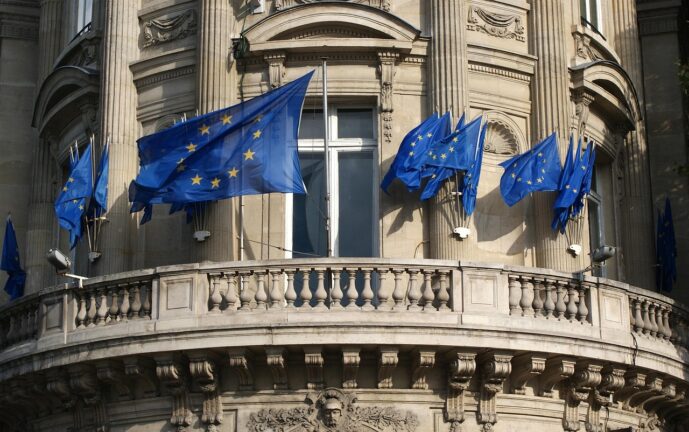The Union seeks to link trade, security, and development aid to digital technologies “at the centre of EU external action”. The Council has approved this intention, hoping to stop Europe falling further behind America and China. Brussels also wants to export its own rules on digital privacy and competition.
The European Union wants its foreign policy to speak digital first. At a Brussels Council meeting on 20 November, ministers agreed a central role of technologies. They backed a blueprint that links digitalisation of trade talks, security deals and development aid to the mix shaping today’s power.
A ‘tech business offer‘
“The conclusions set out an ambitious vision for how the EU will engage in global digital affairs,” the Council declared. That ambition extends to money. A new “EU tech business offer” promises easier market access abroad and deeper investment at home, all wrapped round European standards on data and security. Member states also insisted that the Commission and the EU’s diplomat-in-chief report back regularly—evidence of nerves that grand strategies often fade once the communiqués are filed.
“The Council endorses the strategy’s objective for the EU to support a sustainable, secure and trusted digital transformation globally, and to shape tech and digital governance together with partner countries.” That sentence is the spine of the document. Europe will try to turn values such as transparency into global norms. Whether partners line up remains to be seen.
The European Council’s recent digital strategy sets out five main objectives guiding how the EU plans to engage in global digital affairs. Here is what each means in practical terms.
You might be interested
Digital diplomacy takes shape
Placing digital and technology at the centre of EU external action. This means making digital issues a core part of the EU’s foreign policy and international work. Instead of treating technology as a side topic, the EU intends to prioritise it in dealings with partners worldwide.
Practically, this could involve pushing digital cooperation in trade agreements, advocating European values like privacy and security in international forums, and ensuring that digital innovation supports wider goals such as climate action or development. It signals that technology is no longer just an economic issue but a key pillar in how the EU asserts its global role.
Building partnerships and alliances. The EU aims to form stronger connections with countries and groups that share its digital vision and standards. This includes collaborating on infrastructure projects like secure data networks, agreeing on common rules for AI and cybersecurity, and jointly investing in emerging technologies. By building a web of like-minded partners, the EU hopes to increase its influence and counterbalance tech giants from other regions. In practice, this might mean strategic deals with countries around the Mediterranean, Africa, or Asia to ensure a reliable and secure digital supply chain aligned with European values.
Strengthening the global role and influence of the EU tech industry. Europe wants to make its technology firms more competitive and visible on the world stage. This involves simplifying regulations to help innovative companies grow across borders within Europe and beyond, helping them access international markets, and investing in key technologies like cloud computing and AI. By backing “Made in Europe” digital products and supporting startups through legislation and funding, the EU seeks to nurture companies that can rival global players. This translates into more European tech exports, jobs, and technologies that set global standards.
Securing the next wave
Partnering for a secure and trusted digital transformation. Security and trust underpin the EU’s digital ambitions. The goal is to ensure that digital technologies adopted globally are safe, respect privacy, and are resilient against cyber threats. The EU wants to work with partners to build robust digital infrastructure—such as secure networks and trustworthy AI systems—that protect citizens and businesses.
The Council endorses the strategy’s objective for the EU to support a sustainable, secure and trusted digital transformation globally, and to shape tech and digital governance together with partner countries. — The European Council press release
This also means aligning on cybersecurity norms and responding jointly to threats. On the ground, this could mean joint initiatives to improve cyber defence capabilities. It also could mean setting global rules for data protection that partners adopt.
Global digital governance lead
Governance. The rules and standards shaping the digital world cover above all data use, AI ethics, and platform accountability. The EU aspires to shape these rules internationally, based on its democratic values and human rights commitments. Brussels thus hopes to make its model the global norm, rather than having rules set by others with different priorities.
Practically, this means active participation in global standard-setting bodies, negotiating digital trade rules, and promoting transparency and accountability in tech at worldwide forums. It is about the EU having a strong voice in deciding how technology impacts society.
In summary, the EU’s five objectives represent a wide-ranging push to integrate digital concerns into foreign policy, foster alliances that share European values, boost its tech companies’ global prospects, ensure secure and trustworthy digital transformations, and lead the shaping of international digital rules. These goals, if realised, aim to keep Europe influential and competitive in an increasingly digital world.











